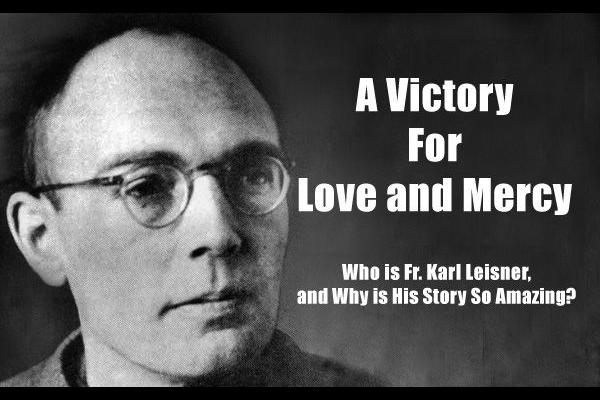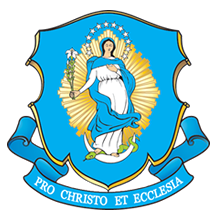
I enjoy looking into the archives of our Province and digging up gems. There are a number of old reel-to-reel tapes that have sat and collected dust for years, and I've wondered just what is recorded on them? Finally, with the help of my parents, I was able to get an old reel-to-reel tape deck working from the Marians' Chicago house, and I have discovered some lost treasures.
Among them, episodes of a dramatic radio program called "The Hour of St. Francis." Each show is only 15 minutes, so the term "hour" here is used figuratively. One episode was titled, "The Victory of Father Karl," which chronicles the trials of Karl Leisner, who became a priest while interred in Dachau, the Nazi German concentration camp. At the end of the program, I wondered, "Could this really be true?" A quick check on the Internet found that not only is the story true, but Fr. Karl Leisner was beatified by Pope John Paul II in Germany in 1996. I also found that there is a book called The Victory of Father Karl by Fr. Otto Pies, S.J. It was translated from the German in 1957.
But who is this Fr. Karl, and why is his story so amazing?
Blessed Karl Leisner was born in 1915 in Westphalia, Germany. He grew up in Kleve, and during his school years, he became such a good youth organizer that the high school chaplain suggested he create a youth group, at the age of 12!
The group of boys, called the Saint Werner Group, often went on bicycle trips, which included the Holy Sacrifice of the Mass as the high point of the day. They would play music and pray various prayers, including acts of devotion to Our Lady.
As he grew, he excelled in schoolwork and also had a deep awareness of God. He wrote of needing the love of God and joy in his soul. While he was still in high school, as National Socialism came to power, he would need God to show him the way to love. Karl continued to work to lead youth to Christ, but now there was a new youth movement coming: Hitler Youth. Persecution was on the way.
He discerned a call to the priesthood and applied to the Theological Seminary in Muenster. Because there were many applicants, he was put on a waiting list. He used the time of waiting to volunteer for the compulsory youth labor service newly instituted by the Nazis - essentially to get it over with. During it, he was thrilled when he obtained the possibility to attend Holy Mass on occasion, for himself and others.
After this time, he entered the seminary. It was now 1934, and the Nazis continued to attack Catholic institutions. After the closing of a youth house in Dusseldorf in 1935, Karl wrote, "But we maintain our Christian, courageous calm. Nobody will take away our will to struggle and fight back as long as He is with us. God is the ruler of the fates of men and peoples. This is our victory, which overcomes the world."
He wrote a poem that expressed his feelings at this time:
Though the road wind through the blackest night,
Victory will be ours in the dawn's crimson light.
We are ready to proclaim, in all lands and climes,
That God is the Lord even of these our times.
Karl continued to work with youth, and the Gestapo noted it. They opened a secret file on his activities in 1936. They watched his movements and read his mail.
His studies continued, and he was ordained subdeacon and then deacon. But in 1939, shortly after he had been ordained deacon, his health quickly deteriorated. He was diagnosed with tuberculosis in both lungs. He went for treatment to a hospital in the Black Forest.
After six months, his health was improving, but one day after hearing about an attempt to assassinate Hitler with a bomb, he remarked that it was a pity that Hitler wasn't there when the attack occurred. This was reported to the authorities, and within hours, Karl was arrested.
He was moved from one prison to another and then sent to Dachau. At this time, Heinrich Himmler, head of the Schutzstaffel (SS), ordered all priests to be sent there. There were between 1,500 and 2,000 priests in the camp. Priests from 25 different European countries found themselves in Block Numbers 26 to 30. Karl arrived at Dachau on Dec. 8, 1940 - the feast of the Immaculate Conception.
The authorities allowed a chapel to be built in Block 26. There was even a makeshift tabernacle. It was made of wooden boxes and tin cans. Still, it was sufficient to house the King of Kings in this terrible environment in which He and His priests were treated with contempt. Jesus was there. The Holy Sacrifice of the Mass was allowed once each morning at 5 a.m., just before the dawn roll call.
Although he suffered from depression, Karl kept up the spirits of others. Other prisoners remembered his cheerful disposition, and he would lead songs, just as he did with youth groups. One prisoner said of him, "Karl was always friendly to every fellow prisoner. He talked to everyone and inquired in the greatest detail about the latest bit of news. I never heard him speak an unfriendly or an impolite word; and I never saw him unwilling to do anything." He still longed for the priesthood, but that did not appear to be likely.
In 1941, his condition worsened. The tuberculosis was taking its toll. A blood vessel in his lung broke on March 15, causing blood to come from his mouth. He had a high fever. He was put in the camp hospital, which was as good as a death sentence.
This was a time of great trial for him, and he questioned God's providence at times. He held on to a particular Gospel verse, a favorite in his: "And we have come to know, and have believed, the love that God has in our behalf" (1 Jn 4:16). He did not want to give up his firm belief in love. In all this suffering, he held onto a "faith in love." To others, Karl was a ray of hope. He did not allow them to see his struggles. The possibility of his ordination seemed quite remote at this time.
Then, in September of 1944, there was a bishop among the new prisoners. Bishop Gabriel Picquet, of the diocese of Clermont-Ferraud, in France, was now among the inmates in Block 26. Others told him of Karl and his situation.
The bishop agreed to ordain him, but a letter of authorization was needed from the local bishop. A young novice of the Convent of the Poor Sisters in Freising was the vital link in passing the letters back and forth and for bringing the holy oils and other things needed for an ordination. She would get vegetables and plants that people bought from the camp greenhouse, but this was mainly so that she could pass other things in and out of the camp. (This girl, Sr. Josepha Imma Mack, later had the privilege to attend his beatification in 1996.)
The day was set for the ordination: Dec. 17, 1944. This was Gaudete Sunday - the Third Sunday of Advent. The SS were not aware of the plans, although they suspected something. Still everyone involved considered the risks worth it. He was ordained with all the splendor that could be mustered in the poor circumstances of the prison camp.
Father Karl celebrated his first Mass on Dec. 26 - the feast of St. Stephen the Martyr, but it was the only Mass he would ever celebrate. He was quite weak at this time, and although he survived to the time of the liberation of the camp by the Allies on April 29, 1945, he was then moved to a hospital where he died on Aug. 12.
He kept a diary in the hospital, and his last entry, on July 25, 1945, ended with "Bless my enemies, too, O Lord. 'Lord lay not this sin to their charge.'" The final words were a quote from St. Stephen when he was being stoned.
When Pope John Paul II beatified Fr. Karl Leisner, he held the staff used by the bishop when Bl. Karl was ordained. The beatification occurred at the Olympic Stadium built in 1936 by Adolf Hitler for the Olympic games. The stadium was meant to show the power of the Nazi regime, but the lasting power of God's grace had triumphed in the end. Pope John Paul II said that day, "Karl Leisner encourages us to remain on the way that is Christ. We must not grow weary, even if sometimes this way seems dark and demands sacrifice. Let us beware of false prophets who want to show us other ways. Christ is the way that leads to life. All other ways are detours or wrong paths."
Blessed Karl Leisner, pray for us.
















